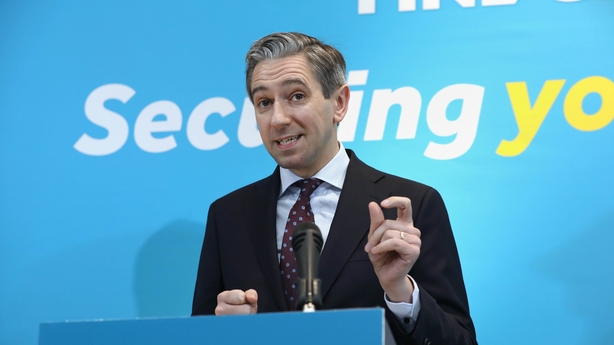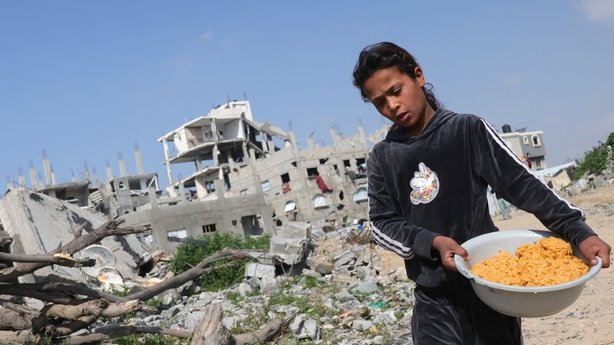Ireland has secured language in a key EU communique which the Government believes will support its handling of the Occupied Territories Bill (OTB) and possibly ease the bill's potential conflict with EU law.
The inclusion of the text, seen by RTÉ News, follows intense lobbying by Irish diplomats in advance of a long-awaited meeting of European Union foreign ministers and a high-level Israeli delegation.
The meeting of the EU-Israel Association Council will take place this afternoon in Brussels and will be attended by Tánaiste and Minister for Foreign Affairs Simon Harris.
Ahead of the meeting, member state officials have finessed a compromise text on the EU’s position that covers relations with Israel, particularly in light of the Gaza war.
The paragraph of interest to Ireland implicitly relates to the International Court of Justice’s (ICJ) opinion last July on Israel’s occupation of Palestinian territories.
Since the opinion was issued, Ireland has argued that it places an obligation on the EU to avoid any trade which would facilitate Israel’s occupation and illegal settlements.
The ICJ opinion revived the Coalition’s determination to proceed with the Occupied Territories Bill, despite a belief during the lifetime of the previous coalition that it would be contrary to EU trade law.
The Irish Government believes the ICJ opinion means the EU is bound to restrict sales of goods produced by illegal Israeli settlements.

EU officials have disputed this interpretation, insisting that internal legal advice indicates the EU is in compliance with the ICJ opinion.
There has been speculation that if the OTB goes ahead, the case would end up in the European Court of Justice.
With the legal question still unresolved, it is understood the Government believes the inclusion of this specific text ahead of today’s EU-Israel meeting will provide some legal space that could help the bill to proceed.
However, EU sources suggest the relevant text also accommodates those national capitals traditionally supportive of Israel in that it makes it clear the EU’s trading restrictions on Israel do not amount to a boycott.
Nevertheless, Dublin believes the paragraph will provide further legal cover for the OTB.
It is understood Irish officials pushed to have an earlier draft, restating the EU’s position, strengthened, with a greater focus on international law and how it relates to exports from Israeli settlements.
The paragraph in the final EU text states that "the EU and its Member States are committed to fully comply with international law and to implement EU legislation as well as the bilateral technical arrangement applicable to [Israeli] settlement products accordingly".
While the EU excludes settlement goods - which are said to be minimal - from its preferential trade arrangements with Israel, selling them into the EU per se is not illegal so long as they are labelled as originating in the Occupied Territories.

The agreed text goes on to state that "the EU expresses its commitment to ensure that - in line with international law - all agreements between the State of Israel and the EU must unequivocally and explicitly indicate their inapplicability to the territory occupied by Israel in 1967".
In other words, emphasising that EU-Israel preferential trade arrangements do not apply to the Occupied Territories.
The convening of the EU-Israel Association Council itself has been highly contentious and has been overshadowed by deteriorating relations between Israel and a number of member states, including Ireland.
In February last year, then taoiseach Leo Varadkar and his Spanish counterpart Pedro Sanchez, wrote to the European Commission President Ursula von der Leyen, asking her to investigate if Israel was in breach of Article 2 of the EU-Israel Association Agreement, which covers trade.
Taking Israel to task, if it were indeed in breach, would require a convening of the Association Council.
Article 2 binds both parties to the Association Agreement to human rights obligations and international law.
The issue was taken up by Josep Borrell, the former EU foreign policy chief, who raised the Irish-Spanish letter with EU foreign ministers.
Due to objections by a number of member states traditionally supportive of Israel, the European Commission was not given the relevant instructions to explore if Israel was in breach of Article 2.
Mr Borrell sought a meeting of the EU-Israel Association Council, which would bring both sides face to face, as a way of potentially addressing Ireland and Spain’s concerns.
We need your consent to load this rte-player contentWe use rte-player to manage extra content that can set cookies on your device and collect data about your activity. Please review their details and accept them to load the content.Manage Preferences
While Tel Aviv indicated it could consider a meeting of the Association Council, it is understood the Israeli government - whose relationship with Mr Borrell had deteriorated - wanted to wait until his term ended last November and he was replaced by the current High Representative for Foreign Policy Kaja Kallas.
Once Ms Kallas took over, a meeting of the EU-Israel Association Council was scheduled, and it will follow today’s regular meeting of EU foreign ministers.
However, agreeing an agenda for the meeting, and forging a common EU position, proved highly difficult, according to sources.
It is understood the Israeli side objected to having the Gaza war as a first item on the agenda, although the Israelis eventually dropped their objections.
Israel wanted to focus on the Iranian threat in the Middle East, rather than focus on the Gaza war, sources have said.
However, there were also problems in forging a common EU position.
Officials say ongoing and stark differences of opinion between those member states seen as pro-Israel and those regarded as pro-Palestinian, meant agreeing a common EU position ahead was difficult.
It is understood the final EU draft was only agreed on 14 February.
Sources have told RTÉ News that the last issue agreed was Ireland’s attempt to insert a paragraph that related to imports from Israeli settlements in the Occupied Territories.
It is understood the Government saw a key opening in the discussions which would bring clarity to the issue of goods coming from illegal Israeli settlements, in a way that had a clear link to the Occupied Territories Bill.
EU sources have suggested, however, that the agreed text carries a degree of "creative ambiguity".
The statement makes it clear that any focus on products coming from the Occupied Territories "does not constitute a boycott of the State of Israel, which the EU strongly opposes".
At today’s meeting, the Tánaiste is expected to strongly condemn Hamas’s recent actions around the release of hostages and to say it is vital the ceasefire remains and is implemented in all phases.
He is also expected to say that the "catastrophic" situation in Gaza has prompted concern both in Ireland and across Europe, and that Ireland is "steadfast" in its view that there must be full and unimpeded access for humanitarian aid, and that respect for international law and a process to bring about a two-state solution are vital.







